Ceremonial Plantings Index |
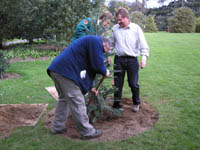 Add a Wollemi to your wish list The prehistoric Wollemi Pine goes on sale in the UK
The remarkable Wollemi Pine, Wollemia nobilis, is now available to advance purchase in the UK in association with the
The Wollemi Pine, the ultimate survivor, has proven to be hardy and versatile in cultivation. Nearly 1 year ago, 15 Wollemi Pines were planted in three different secret locations in the arboretum at Kew Gardens to test how the trees discovered in Australia would fair in the UK climate.
Each tree was planted in identical conditions and without any form of protection to help it weather what has been one of the coldest winters for many years. The Wollemi Pine has demonstrated great resilience and the trees appear to have endured these temperatures without any detriment to their growth and apical shoots.
A royalty from the sale of each Wollemi Pine in 2006 will be donated to the Royal Botanic Gardens, Kew to help fund vital work in conserving other plant species around the world on the brink of extinction.
|
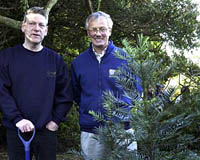 Royal Botanic Gardens, Wakehurst, SussexAfter trials at secret locations in the UK the long-awaited appearance of the tree in this country finally happened, and the Wollemi took its place amongst the rarest trees in the world, conserved for all to see at Kew Gardens and Wakehurst Place, where seeds are preserved in the Millennium Seed Bank.
Sir David Attenborough planted the tree at Kew, while Kenneth Branagh planted a sister tree at Wakehurst Place. Read More... |
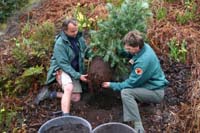 200 million-year-old ‘Jurassic pine’ planted at Eden - 21 April 2006The Australian Park Ranger who discovered a type of pine tree dating back 200 million years has visited the Eden Project to plant one of the rare specimens.
It was the first time David Noble has planted a Wollemi Pine in the Westcountry - and only the second specimen he has personally planted in the UK. It was also a return to David's roots as his family originates from the West of England.
Kernock Park Plants, based in Saltash, Cornwall, which is the only company in the UK licensed to grow and distribute the pine, teamed up with Eden to bring David to the Eden Project to plant the 6ft specimen.
The tree will now be on full public display on Eden's main access path and, unlike many of the plants currently on show in the UK, it will not be hidden behind a wire security cage.
David said: "It was a great honour for me to be able to discover the Wollemi Pine and I'm delighted to have been able to visit the Eden Project to plant a specimen here as part of the world-wide conservation effort.
"Eden is the ideal place in the UK to plant a Wollemi Pine outdoors as the climate is very similar to its natural habitat and the sheltered location means the tree should flourish - maybe reaching 20-30 metres over the next 50 years.
"It's a great setting, with the fantastic Biomes and a very impressive outdoor area. I hoped people enjoy seeing the Wollemi Pine here."
Tom Keay Eden's Temperate Curator agreed that the Cornish climate should be ideal for the pine and said everyone was looking forward to seeing how well the tree performs.
Tom said: "The chances of discovering a tree like this are very rare and it will probably never happen again.
"Eden feels privileged to be part of the conservation of this tree and it is great that our visitors can enjoy a fine specimen planted by its discoverer.
"It is also a real feather in the cap for Cornish horticulture that Kernock Park Plants is playing such a vital role in the conservation of the Wollemi Pine."
The Pine is unique to its Wollemi habitat and less than a hundred specimens existed at the time of David's discovery. To aid the conservation effort, the species is now being propagated and sold to the public, with Kernock Park Plants having the sole rights to distribute the tree in the UK.
Bruce Harnett, Managing Director of Kernock Plants, said: "This is a unique opportunity for us to be able to link horticulture with conservation. Everyone here at our nursery is very enthusiastic about the future prospects for this dinosaur."
"This pine has really captured the imagination of most people that have heard anything about it. Those that are buying the pines range from the plant enthusiasts to those who just want a piece of Jurassic history."
|
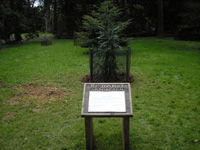 Pre-historic tree back in UKOne of the world's rarest and most ancient trees has been planted at the Westonbirt - The National Arboretum in the Cotswolds as part of a worldwide conservation project.
The pre-historic Wollemi pine was thought to be extinct until a specimen was found in its native Australia 12 years ago.
The pine which dates back more than 200 million years to the time of the dinosaurs, can reach a height of more than 40 metres in the wild and can live for more than 200 years.
David Noble, who discovered the tree in 1994 whilst canyoning near Sydney, planted the pine at Westonbirt Arboretum, near Tetbury, Gloucestershire.
Mr Noble, 41, a ranger with the New South Wales National Parks and Wildlife Service said he was honoured that the tree had been named after him.
He said: "I was out canyoning and abseiling in a gully in the Wollemi National Park when I came across the tree.
"I don't think anyone had ever stepped foot in that gully before and the tree looked very unusual so I took a sample and got it checked out."
The planting on Specimen Avenue at Westonbirt will form part of an international conservation project designed to save the rare tree.
Simon Toomer, curator of Westonbirt Arboretum added: "It looks like a cross between a monkey puzzle tree and a yew tree.
"It's incredibly primitive looking and quite beautiful and with the great age the trees date from is something of a living fossil."
|
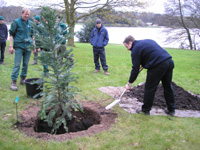 Trentham To Have One Of World's Oldest And Rarest TreesTrentham became one of the first places in the UK to acquire a specimen of possibly the world's oldest and rarest tree, the Wollemi Pine discovered 12 years ago in Australia.
The prized tree - a 6ft Wollemi Pine - was planted in the 750-acre North Staffordshire estate on April 25 - Australia's National Day - by David Noble, the Australian national parks and wildlife officer, who made the amazing discovery in a secret location within the vast Wollemi National Park, 200km west of Sydney in 1994.
Michael Walker, garden manager at Trentham, arranged for the estate to acquire one of the first limited batch of the trees, propagated in Australia, being made available from Kernock Park Nurseries, Cornwall, the sole agent appointed to grown and sell the tree in the UK.
Trentham is the first place in Central England to receive a Wollemi Pine. Kew Gardens was the first recipient in the UK and Mr Noble, who is on a short visit to this country, is also planting specimens at the Eden Project in Cornwall, Westonbirt Arboretum in Gloucestershire, and at the Royal Horticultural Society's Harlow Carr in Harrogate.
Mr Noble found fewer than 100 mature trees, some of them possibly more than 1,000 years old, when he made his historic discovery. Previously, it had been thought the Wollemi Pine was extinct with only 90 million year old fossil records remaining. The tree is believed to only have grown in Australia.
The Wollemi has been declared as a new species in the same family as the Monkey Puzzle and Norfolk Island Pine. It is being propagated in a Queensland nursery and growing trials are taking place at Kew Gardens. A limited number of the trees are being sold in the UK and the royalties from the sales will be donated to the Royal Botanic Gardens, Kew, to help fund vital work in conserving other plant species around the world on the brink of extinction.
The conifer has unusual dark green foliage with bark which looks like bubbling chocolate. In winter a wax coating appears to protect the new growing tips. The Wollemi Pine can withstand temperatures from minus 5 to 45 degs C.
"The Wollemi Pine will become a celebrity among the vast number of trees we have at Trentham and no doubt attract many people eager to see such a rarity," explains Mr Walker.
* At the time the discovery was made, Prof. Carrick Chambers, director of the Royal Botanic Gardens, Sydney, said: "This is the equivalent of finding a small dinosaur alive on Earth."
|
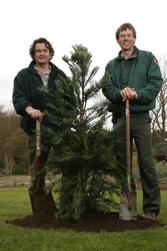 Rare prehistoric Wollemi Pine planted at Harlow CarrA Wollemi Pine, previously thought to be extinct as a species, is to be planted by David Noble, its Australian discoverer, in the woodland at RHS Garden Harlow Carr to help support its conservation and to establish how it fares in a northern climate.
It will be the first to be planted in the North of England, and is also one of only five planting locations in the UK - the other four being at the Royal Botanical Gardens Kew, The Eden Project, Westonbirt Arboretum and Trentham Gardens.
The Wollemi Pine is a member of the Araucariaceae family - thought to have existed 200 million years ago at the time of the dinosaurs. David Noble discovered it whilst 'canyoning' in the Wollemi National Park near Sydney, Australia, in September 1994 when he noticed a strange looking tree; tall but fern like with bubbly brown bark.
He collected a piece of its foliage from the forest floor and the rest is the history of the discovery of a brand new species previously not known to humans; the Wollemi Pine. It has since been officially named Wollemia nobilis after David Noble. As David has said; "Thankfully I had a surname that suited the stature and grandness of the Wollemi Pine."
|
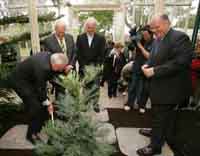 Wollemi Pine in IrelandOn 10th September 2005 the first Wollemia nobilis was planted in Irish soil at the National Botanical Gardens of Ireland, it was planted inside the central house of the Curvilinear Range by Mr Ahern, Taoiseach (prime minister) of Ireland.
The Australian Ambassador to Ireland, His Excellency Dr John Herron and the Irish Ambassador to Australia, His Excellency Mr Declan Kelly were in attendance along with Dr Peter Wyse Jackson, Director of the National Botanical Gardens.
The Wollemi Pine appears as one of the subjects of National Botanical Gardens of Ireland 'Jurrasic Bark' Display.
The exhibition shows how plant ancestors evolved to leave their watery habitats and colonise the land.
The display of fossil plants and their living relatives will be on show in the Gallery of the Education & Visitor Centre from the 5th May to 16th June 2006.
The exhibit features live plants from the collections of the National Botanical Gardens of Ireland, together with fossil plant specimens representing the ancestors of the present-day Plant Kingdom. The fossils come from the unique collection at Trinity College Geology Museum - the curator of which, Dr. Patrick Wyse Jackson, has masterminded the exhibition.
|
A Bonzer Welcome at BatsfordBatsford Arboretum laid on a bonzer welcome of fine weather for its latest plant - a sapling of the Wollemi Pine from the Blue Mountains in Australia, which is reputed to be one of the rarest trees in the world.
The Batsford specimen, just over a metre high now, is expected to grow to a height of 20 to 25 metres (although it would be equally happy kept as a pot plant). It will take some 10 years to bear cones,
"At the moment it's a bit jet lagged and thinks it's going into winter," said Tony Kirkham, head of arboreta at Kew. "But we'll wake it up with some TLC and fool it into thinking it's just missed winter. |
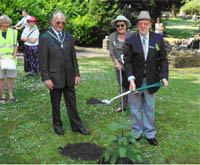 Centenary Celebrations at Collett ParkOn the 10th June as part of the celebrations of the centenary of the gifting of Collett Park by John Collett to Shepton Mallet, one of the nearest relatives to the benefactor, John Kyte Collett planted a Wollemi Pine in the park. |
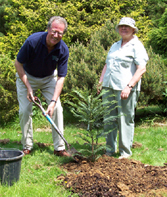 Botanic find of century planted by Garden's Member at the Sir Harold Hillier GardensGarden supporter Jenny Grundy has planted the endangered Wollemi Pine at Sir Harold Hillier Gardens in Romsey.
It was planted at Noon on Monday 12th June at the top of our 220 metre long Centenary Border.
Mrs Jenny Grundy, Member and supporter of the Gardens who donated the tree, was thrilled to dedicate the tree to her late husband: "He was a loving man who encouraged my interest in botany. When I heard the Wollemi Pine was for sale, I knew it would be perfect to remember him by - a rare tree for a rare man."
Recently appointed director of the Gardens, Robin Kealy C.M.G. M.A. added: "We rely on generous and faithful supporters like Jenny to help us develop this world-renowned hardy plant collection. This exotic and beautiful tree is a valuable addition to our collection and we will love and nurture it."
A second Wollemi Pine will be planted amongst our spring-flowering plants. It was donated by plant enthusiast David Brown and will further help to protect this plant and other plant species in danger of extinction.
The pine joins an impressive conifer collection started by the founder of the garden, the late Sir Harold Hillier. He loved conifers and would have planted the Wollemi Pine, especially after he sought for many years to acquire seeds of the Dawn Redwood that was similarly discovered in 1941. The two conifers are ancient and provide valuable clues about plant evolution, and now the gardens are home to both.
The pine also continues the tradition of growing new plants from around the world, although this tree is a particular challenge.
It is encouraging for The Garden that the support of donations from visitors and Members has made it possible to grow the Wollemi pine. It is an important step for the continuing development of an important natural resource for recreation, conservation and education, not only in Hampshire, but for the whole world.
|
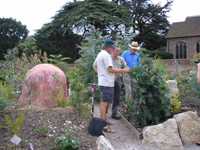 Dinosaur Tree helping to Save Garden from ExtinctionOn Monday 10th July, Guy, Tom Hart-Dyke’s father planted the living fossil in the Australian border within the map shaped garden at his ancestral home – the subject of ‘Save Lullingstone Castle’ BBC2.
Tom said: ‘over the past two years I’ve been so lucky receiving plant donations from all over the UK and Ireland – and although we’ve been given nearly £5,000 worth of plants, nothing can beat the donation of the Wollemi for excitement! I know I get excited about plants, but the Wollemi is special. I first saw the tree in Sydney gardens on my fateful plant hunting expedition in 1999 and I’ve been obsessed with it ever since’.
Mark Taylor of Kernock says: “We are very excited and honoured to be part of a world wide effort to bring the Wollemi Pine back from the edge of extinction and we’re delighted to be able to give a helping hand in saving both Lullingstone Castle and the Wollemi Pine at the same time. We are sure that both are well on the way to recovery”.
Tom Hart Dyke has spent the last couple of months planting up the rare plant species from across the world in his ‘World Garden of Plants’. Education and conservation are strong themes at the garden in Kent.. Mark Taylor said: “Having a Wollemi Pine Planted in the World Garden at Lullingstone Castle is another step in two of the most amazing conservation stories of modern times and it’s great to be able to bring these 2 survivors together; both Tom and the Wollemi are here it seems against all odds”
Tom Hart Dyke was kidnapped in 2000 in the Darien Gap in Panama and held hostage for nine months by Colombian Guerrillas. During his kidnap ordeal Tom spent his time building jungle gardens and jotting down plans in his diary for a map garden containing plants from across the world planted out in their respective countries of origin. After his release, Tom set about building ‘The World Garden of Plants’ at Lullingstone Castle (the story of which is told in Save Lullingstone Castle BBC2. Second series due out later this year).
|
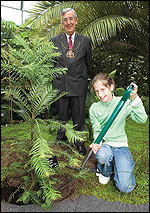 Planting at Duthie GardensA RARE Australian pine tree - one of the world's oldest species that allegedly dates back to time of dinosaurs - was planted at Aberdeen's David Welch Winter Gardens on Monday, August 14.
Lord Provost John Reynolds was on hand to see the Wollemi Pine planted in the Temperate House, at the Winter Gardens, in Duthie Park.
Less than 100 adult Wollemi Pine trees remain in the wild, although it was once much more widespread across Australia.
The tree was presumed extinct for over 200 million years before being rediscovered in 1994 by David Noble in a rainforest gorge in Wollemi National Park, located in the Blue Mountains that are west of Sydney.
The Wollemi Pine is named after the national park where it was found.
‘Wollemi’ is an Aboriginal word meaning “look around you, keep your eyes open and watch out.”
The tree that was planted on Monday afternoon is currently about 3ft high. The largest known Wollemi Pine in the Australian rainforest, however, stands at around 130ft high but gardeners at the city’s Winter Gardens will restrict the root growth of the Wollemi planted at the Winter Garden so it remains within the constraints of the Temperate House.
Alan Findlay, facility manager at the David Welch Winter Gardens, said: “The Wollemi Pine is from the same family as the popular Monkey Puzzle and Norfolk Island pine.
“The cultivation and worldwide release of the Pines is a key component of a conservation strategy to protect the pines.
“Having Wollemi Pines in gardens like the Winter Gardens is one of the best forms of insurance against loss in the wild.
“The royalties from the sale of Wollemi Pines support conservation of it and other rare and endangered plant species.”
The Lord Provost added: “The new Wollemi Pine tree is sure to prove popular with visitors who will be interested in its history and the conservation work and I am delighted to be taking part in seeing this rare tree planted in the David Welch Winter Gardens.”
|
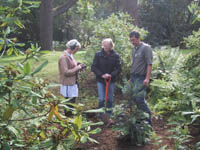 One of the first Wollemi Pines to be planted in Northern IrelandA Wollemi Pine was planted by Phil Rollinson the Head Gardener at Mount Stewart, one Northern Ireland's most popular National Trust properties.
Phil was interviewed by Cherrie McIlwaine the presenter of BBC NI Gardener's Corner.
Commenting on the significance of the planting, Phil Said "This is an amazing privilege for Mount Stewart Gardens and the National Trust in Northern Ireland" The tree is in a shady spot in the woodland close to a grove of its close relatives the Agathis and also not too far away from another close relative the Monkey Puzzle.
|
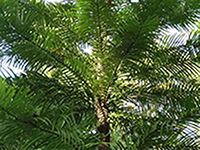 Bedgebury National PinetumThere are several Wollemi Pines planted in the Pinetum but the first specimen to arrive at Bedgebury was handed to the Pinetum, via Kew, by HM Customs who had seized it from the luggage of a traveller smuggling it into the country. |











